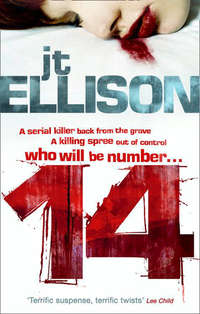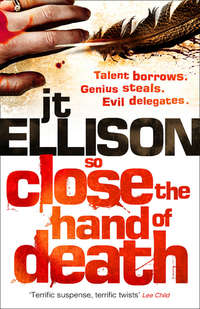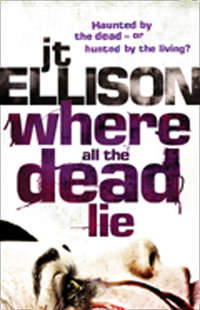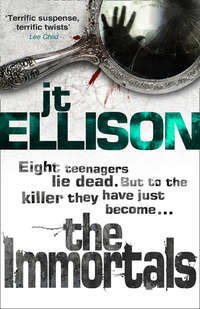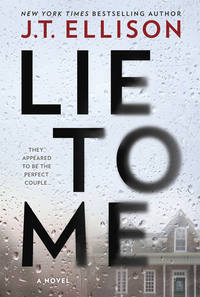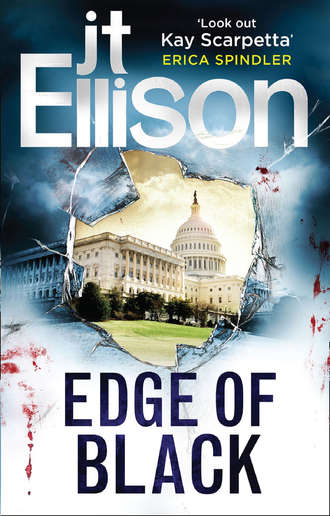
Полная версия
Edge of Black

The path of the righteous man is beset on all sides
Dr. Samantha Owens is starting over: new city, new job, new man, new life. She’s trying to put some distance between herself and the devastating loss of her husband and children—but old hurts leave scars.
Before she’s even unpacked her office at Georgetown University’s forensic pathology department, she’s called to consult on a case that’s rocked the capital and the country. An unknown pathogen released into the Washington Metro has caused nationwide panic. Three people died—just three.
A miracle and a puzzle...
Amid the media frenzy and Homeland Security alarm bells, Sam painstakingly dissects the lives of those three victims and makes an unsettling conclusion. This is no textbook terrorist causing mayhem with broad strokes, but an artist wielding a much finer, more pointed instrument of destruction. An assassin, whose motive is deeply personal and far from understandable.
Xander Whitfield, a former Army Ranger and Sam’s new boyfriend, knows about seeing the world in shades of gray. About feeling compelled to do the wrong thing for the right reasons. Only his disturbing kinship with a killer can lead Sam to the truth...and once more into the line of fire.
Praise for J.T. Ellison
‘Scintillating… Suspenseful… Startling…’
Publishers Weekly
‘Mystery fiction has a new name to watch.’
John Connolly, New York Times bestselling author
‘Tennessee has a new dark poet.’
—Julia Spencer-Fleming
‘J.T. Ellison’s debut novel rocks.’
Allison Brennann, New York Times bestselling author of Fear No Evil
‘Creepy thrills from start to finish’
James O. Born, author of Burn Zone
‘Fast-paced and creepily believable…gritty, grisly and a great read’
M.J. Rose, internationally bestselling author of The Reincarnationist
‘A turbo-charged thrill ride of a debut’
Julia Spencer-Fleming, Edgar Award finalist and author of All Mortal Flesh
‘Fans of Sandford, Cornwell and Reichs will relish every page.’
J.A. Konrath, author of Dirty Martini
‘Shocking suspense, compelling characters and fascinating forensic details’
—Lisa Gardner, New York Times bestselling author of Catch Me
‘A Deeper Darkness has everything I love in a thriller: stunning twists and shocks, fascinating forensics and heroines I deeply cared about. J.T. Ellison is one of the best writers in the game.’
—Tess Gerritsen, New York Times bestselling author of The Silent Girl
J.T. ELLISON is a bestselling author based in Nashville, Tennessee. She writes the Taylor Jackson and Samantha Owens series, which have been published in more than twenty countries. Visit her website, www.JTEllison.com, for more information or follow her on Twitter @Thrillerchick.
Also by J.T. Ellison A DEEPER DARKNESS*
ALL THE PRETTY GIRLS
14
JUDAS KISS
THE COLD ROOM
THE IMMORTALS
SO CLOSE THE HAND OF DEATH
WHERE ALL THE DEAD LIE
*A Samantha Owens novel
Edge of Black
J.T. Ellison

www.mirabooks.co.uk
For Sherrie Saint—whose twisted mind is a writer’s delight,
and, as always, for my Randy.
Contents
Praise for J.T. Ellison
About the Author
Title Page
Dedication
Epigraph
TUESDAY
Chapter 1
Chapter 2
Chapter 3
Chapter 4
Chapter 5
Chapter 6
Chapter 7
Chapter 8
Chapter 9
Chapter 10
Chapter 11
Chapter 12
Chapter 13
WEDNESDAY
Chapter 14
Chapter 15
Chapter 16
Chapter 17
Chapter 18
Chapter 19
Chapter 20
Chapter 21
Chapter 22
Chapter 23
Chapter 24
Chapter 25
Chapter 26
Chapter 27
Chapter 28
Chapter 29
Chapter 30
Chapter 31
THURSDAY
Chapter 32
Chapter 33
Chapter 34
Chapter 35
Chapter 36
Chapter 37
Chapter 38
Chapter 39
Chapter 40
Chapter 41
Chapter 42
Chapter 43
Chapter 44
Chapter 45
Chapter 46
Chapter 47
Chapter 48
Chapter 49
Chapter 50
FRIDAY
Chapter 51
Chapter 52
Acknowledgments
“In all men is evil sleeping;
the good man is he who will not awaken it,
in himself or in other men.”
—Mary Renault
TUESDAY
Chapter 1
Washington, D.C.
A single beam of light illuminated the path ahead, hovering and bobbing against the concrete walls. The tunnel was narrowing, growing tighter across his shoulder, forcing the joints to compress, pushing on his lungs. His breath came fast. He reminded himself to calm down, inhale through his nose. The mask was making it difficult to see, to smell, anything that might give him a sense of where he was. He paused, counted the number of times his limbs had moved forward. Once, twice, three times, twenty. Roger that. Five more evolutions and he’d be in place.
He squeezed forward, slithering like a snake along on his belly, his legs bunching up behind him, his arms forward, the Maglite in his left hand, his right feeling for the way. Slowly. Slowly.
There. He felt the hinge. Turned it gently, sensed the cooler air blowing up into the vent from below. Reached down into his shirt and pulled out the canister. The gloves made his hands clumsy, but he couldn’t risk contact. He’d die stuck in this shaft, wedged in above the vent, stinking and rotting until someone finally sought the source of the smell.
No one would think to look for him if he were to go missing.
He had no one. He was alone.
He double-checked his mask, made sure he was breathing clean. All systems go.
The clock in his head ticked away, closing down to the final moments.
Five. Four. Three. Two. One.
Time.
With sure hands, he opened the cylinder and depressed the button. The can discharged, spraying silently into the vent.
One. Two. Three. Four. Five.
Empty.
He shook it lightly, but there was nothing else to release. It was done.
He tucked the cylinder back into his shirt and started to move away. He needed to get out of the shaft and back onto the platform, all while avoiding the cameras.
He could do it. He had faith. He’d done three dry runs, and all went according to plan.
He moved out, reversing the slither, arms bunching, forcing his body backward until the resistance ended and he could move his shoulders and hips without constriction. The pipe grew larger, big enough that he crawled onto his knees, turned and faced the exit. He fed a mirror mount down the shaft. No one was around.
Clear.
He dropped lightly to the ground, took three steps to the right to make sure he didn’t accidentally get caught on film, found the metal ladder and began to climb. Higher and higher, his heart lighter and lighter. Success was his.
Below, he felt the first blast of air that indicated a train was coming. The rumbling grew louder, the ladder began to shake. He could have sworn he heard a cough. He paused his climb, held on and breathed into his mask.
This was a better high than you could pay for.
The train passed below him, streaking silver in the dark, rushing the air from the vent toward the platform. He let the rumbling shake his body for a few moments, counting off again, then continued to climb. The exit would be deserted, he’d made sure of that. He had a two-minute window during the shift change to get out.
He set the stopwatch in his head. Two minutes. Mark.
He opened the hatch and climbed onto the deserted platform. Three steps to the right, two steps forward. He’d left his backpack in the trash receptacle. He worked quickly. The mask, canister and gloves went into a sealable plastic bag. His clothes were next: he exchanged the black running suit for jeans and a white cotton T-shirt, pulled on yellow Timberlands. He used hand sanitizer on his arms to eliminate any traces that might have been left behind.
He zippered the bag, tossed it on his shoulder and started walking.
One minute.
The giant disposal catchall was nearly full. As he passed it, he tossed the bag into the depths. He knew they’d be around to empty it in two hours, and all tangible evidence of the crime would disappear into the vast chaos that was the dump.
Now unencumbered, he made better time.
Thirty seconds.
He could hear voices, ahead in the gloom.
Twenty seconds.
He stretched his stride, long legs eating up the pathway.
The elongated shaft of the tunnel appeared before him. His senses were overloaded—orange and blue and white lights, people milling about, yellow hard hats obscuring peripheral vision, getting ready to go back into the tunnels and hammer for the next several hours. He ducked around a column, reversing direction, and slid into the last of the line with the rest of the workers.
Ten seconds.
The first shift ended with a shrieking whistle, and a subway train arrived, rumbling to a stop on the platform. He followed the crowd into the metal tube, took a seat. The rest of the workers filed in behind him, exhausted after their long overnight.
Time.
The train pulled away, building speed, taking him farther and farther from the scene, away, in the other direction, from the canister’s contents.
He was safe.
He risked a small smile. Around him, men’s heads nodded in time as the train rushed along the tracks. He started counting forward, and at ninety-eight, the train began to lurch to a stop.
At exactly one hundred, the doors opened, and he stepped out into the brilliant early-morning sunshine.
Only one thing left to do, then he could depart. Leave this cesspool of a city behind.
Glory was his. Glory be. Glory be.
Chapter 2
Washington, D.C.
Dr. Samantha Owens
Dr. Samantha Owens walked into her lecture hall at exactly 7:00 a.m. The students were already arranged in the chairs, some sitting upright, some obviously wilting. Sam placed her notes on the lectern and turned to the class.
“Perk up, buckaroos. I know it’s early, and I realize the ice-cream social last night involved more ethanol than frozen coagulants, but we have work to do. Who can tell me what Locard’s Exchange Principle is?”
There was quiet laughter, the rustling of paper and laptops opening. Despite the obvious hangovers of many of the students, hands shot up all over the room. Sam called on the closest.
“First row, blue shirt. Go.”
The boy didn’t hesitate. “Any time you come in contact with an object or a space, you take something away and leave something behind.”
“Very good. So when you’re thinking in terms of a crime scene?”
The class chanted together, “There are no clean crime scenes.”
“Exactly.” Sam turned to the whiteboard and wrote Locard’s Theory at the top.
Sam was two weeks into her first teaching gig, and loving every minute of it. She missed the hands-on work that came with being a medical examiner, sure, but this was almost like vacation. Eager, happy, excited, sometimes—okay, often—hungover kids, all dying to learn the tricks of the trade so they could rush out and become the latest and greatest forensic investigators. Once the fall semester began, she’d be teaching at Georgetown University, heading up their new forensic pathology program, but in the meantime, her boss, Hilary Stag, the Georgetown University Head of Pathology, had volunteered Sam for the summer science continuing education program, which included a week of guest lecturing at their rival medical school, George Washington.
She’d been back in D.C. for just a month now. The move had gone smoothly, almost too smoothly. Her house in Nashville had sold quickly despite the depressed market, so instead of rushing into another mortgage, she’d decided to rent on N Street in Georgetown, a beautiful three-story Federalist townhouse that had been gutted inside and completely redone in nearly severe modernism, all glass and stainless and open stairwells, with an infinity lap pool in the backyard. It was as opposite from her snug home in Nashville as she could find, and she quickly realized the minimalist aesthetics pleased her. The only pricks of color were from the flowers she brought in and a few Pollock-like paintings on the walls. Everything else was black and white. She’d sold the vast majority of her furniture anyway, keeping just a few things she couldn’t bear to part with, including a supple white leather couch and her rolltop writing desk—it had been her grandmother’s. She purchased a bed, a small glass table and Eames chairs for the eat-in, and left the rest to chance.
Once the house was set up to her liking, she’d ventured west, into the mountains, to another aesthetically pleasing home nestled in the Savage River State Forest. Alexander Whitfield—Xander—a former first sergeant in the Army Rangers, held a similar outlook: less is most definitely more.
She’d spent a month on the mountain with him, fishing, hiking, sitting in companionable silence in front of his huge fire pit, listening to him play the piano, scratching his gorgeous German shepherd Thor’s ears in languorous time with the music. He wrote songs for her, and with each new note, she could feel the pieces of her soul slowly knitting back together. She treaded gingerly but purposefully into the new relationship, finding surprising compatibilities in many areas, intellectually and physically.
Running away from Nashville had been the smartest move she’d ever made.
D.C. greeted her with warm, sunny days, white marble-columned buildings, grassy expanses and gray-blue waters flowing quickly under the majestic bridges. Xander greeted her with himself. The city paled in comparison.
She realized heads were cocked, awaiting her next bit of wisdom. Anytime Xander got into her thoughts, she got distracted. She figured that was a good thing.
With a smile, she apologized, then ran the class through a typical homicide crime scene, from the job of the death investigator to investigation and collection of the body to the postmortem. A few faces pinched when she started with the autopsy slides, but most hung on her every word.
She was nearly to the last slide when a low murmur began in the back of the room.
She turned to see what the issue was. No one was looking her way. Instead, they were staring at one of the students, a slight blonde who was clearly not paying attention.
“Are my slides boring you?” Sam asked.
The girl didn’t look Sam’s way. She was slumped in her chair. Sam could immediately see something was wrong, though her first thought was, Wow, she’s completely hungover. Hope she doesn’t puke.
A brunette four rows back raised her hand. “Um, Dr. Owens? I think she’s really sick.”
The room began to titter. Sam glanced at her teacher’s assistant. “Reggie, hit the lights.”
The room brightened immediately, and she could see concern written on the students’ faces.
She walked up the stairs to the student and started to take inventory.
Her eyes were glassy. She was shivering, a fine tremor that moved on a loop through her body. Her breathing was shallow and labored, and a sheen of sweat glistened across her face. Her lips were even tinged blue.
Respiratory distress. Hypoxia. Fever.
Shit.
“What’s your name, sweetie?”
Sam felt terrible that she didn’t already know the answer to the question; she’d only learned a few names so far. The students had a month of different classes, and this group had only rotated in a couple of days before. The girl didn’t answer, just stared at the floor and coughed a bit.
“Her name is Brooke Wasserstrom. She’s in my dorm.” The brunette who’d alerted Sam was standing over her friend, worry etched on her face.
Sam put her fingers on the girl’s pulse, which was weak and thready. Her skin was terribly warm.
“Was she drinking last night?”
“Yeah, maybe a little bit. She left early—she was going home to spend the night and the Metro closes at midnight. She came back this morning, I saw her come out of Foggy Bottom when I went for coffee.”
“Do you know if she has any preexisting conditions? Is she diabetic?”
“Not that I know of. I’ve never seen her take anything other than, like, Advil. I don’t know her that well, she lives on my hall is all.”
Brooke’s breathing was getting worse. She needed medical attention immediately. And thankfully, there was a hospital less than half a block away. It would be faster to take her there than call EMS to come to the school.
Decision made, Sam stood up and announced, “I need someone to carry her.”
Reggie came to her side. “I’ll carry her. What’s wrong? Do we need to alert the school?”
“We need to get her over to the emergency room. She needs oxygen. We can worry about the school after she’s stabilized. Let’s go. Kids, class is dismissed.”
The students poured forth from the room, quiet and somber. A few were crying, including Brooke’s dorm mate, who stood frozen on the steps. Sam reached back and touched her arm.
“You need to come with us. Sorry, what’s your name?”
“Elizabeth.”
“Elizabeth. I know you’re concerned. But we need your information about Brooke’s activities over the past few days. So tag along, okay?”
“Yes, Dr. Owens.”
Reggie lifted Brooke into his arms. She folded into him, lethargic and coughing, and Sam grew even more concerned. Elizabeth grabbed the girl’s backpack.
Sam led the way, out the doors, down the hallway and out onto the street. The thin wail of sirens rose in the background, and she felt a chill crawl down her spine. Premonition. Déjà vu. Something.
They exited the building on 22nd and crossed the street to the GW Medical Center. Sam walked them directly into the emergency room entrance, and right up to the triage window. There was a lot of activity behind the glass. Sam glanced around and realized the emergency room was full. Strange for this time of day—they usually filled up at night, when people were ill and couldn’t see their primary doctor, or got themselves involved in a brawl or had too much to drink or took too many drugs. Ten on a Tuesday morning wasn’t exactly peak time.
She pounded on the glass until she got the attention of the harried triage nurse, who flung the glass window open and said, “Have a seat, we’ll be with you in a minute.”
“I have a hypoxic teenager here in acute respiratory distress. She needs oxygen immediately.”
“Jesus, another one?” The nurse slammed the window closed and came around the desk to open the door. “Bring her in.”
Another one? What the hell?
They brought Brooke into the triage station. The nurse took one look at her, opened the door to the back and yelled, “Stretcher, oxygen, STAT.”
Two seconds later a gurney rolled up to the door. Reggie deposited Brooke on the white sheet. She was looking even worse, her eyes closed, her breath coming in little pants. Sam could hear the laboring breath, wheezing in and out, knew the girl was most likely developing rales, the first steps to pulmonary edema. But without a stethoscope, she couldn’t be sure.
This was maddening.
“You may need to intubate her. What do you mean, another one?”
“You’re a doctor?”
“Yes.”
“We’re getting slammed with people with breathing issues this morning. From all over town.” The nurse glanced furtively at Reggie and Elizabeth, whose faces were strained with shock. “We don’t know the cause yet. You two wait out here. You, Doc, come with me.”
Sam narrowed her eyes at the nurse. She turned to Reggie and Elizabeth. “I’ll take it from here. You guys don’t leave without me, okay?”
“Yes, Dr. Owens,” they chimed.
Sam followed the nurse as she pushed Brooke’s stretcher back into the bowels of the emergency room. Obviously she was trying to keep from alarming everyone, but it was clear something major was happening. This was an emergency room in crisis.
The nurse slammed an oxygen mask on Brooke’s face and shouted, “Dr. Evans, we have another one.”
A doctor, bald on top, with a tonsure of curly gray hair circling his skull, approached the stretcher as they pushed.
The nurse ran through the symptom list quickly as the doctor examined Brooke. Brooke’s breathing was declining, and as they pulled the stretcher into an open bay, he called for an intubation tray. A team of doctors and nurses leaped into action, swarming the girl, cutting off her clothes, putting the breathing tube down her throat, getting IVs started in both arms, taking blood. Brooke didn’t even whimper, or fight. She was just lying there, almost comatose.
Sam stepped back out of the way and let them do their work, but couldn’t help noticing that Brooke’s clothes were being handled with extreme care, and all the people working on her were in level-two special protective clothing.
Not good.
The doctor, who Sam surmised was a supervisor, turned to her.
“Are you exhibiting symptoms, too?”
“No.”
“Name?”
“Dr. Samantha Owens.”
“I’m just going to have a quick look.” He shone a light in her eyes, felt her pulse. “Ph.D.?”
“Forensic Pathology, thank you very much.”
He met her eyes then, a lopsided smile on his face. “Southern girl, too.”
“Nashville.”
“I’ve been there. Good barbecue. Any shortness of breath?”
“No. I’ve got no symptoms. I’m her professor, we were in class at GW when she decompensated.”
“Okay. Fever? Cough? Tightness in the chest?”
“No. Nothing. I’m fine. As far as I know, so is everyone in my class except for Brooke. What is going on?”
“We don’t know. We’re seeing people from across the city who are all presenting in respiratory distress. You stick around, okay? Just in case, here’s a mask. We’ll do everything we can for her. Might want to get her parents in, if you can.”
He turned away, dismissing her. He wasn’t telling her everything. Despite his attempt at good humor, she could see the tight lines around the edges of his mouth and eyes. She put on the mask, then allowed the triage nurse to lead her back to the waiting room.
Reggie and Elizabeth had found a corner oasis free of coughing people. Sam took two masks from the nurse and went to the students.



